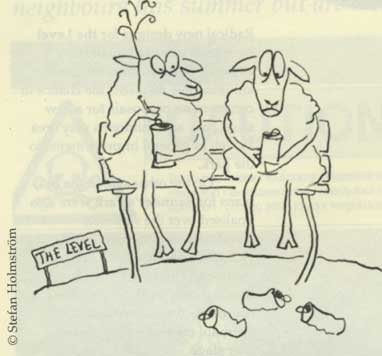The Round Hill Society
The home site of the Round Hill Society, a community group of the residents of Round Hill in Brighton, England. The site contains information about the area, latest news and reflections on life in Round Hill.
Woolly work in the Sussex hills
by Vivien Eliades from The Round Hill Reporter December 2009
With Brighton’s parks to be used for grazing land over the winter, Round Hill’s resident shepherd advises on what to do with all that wool

I've written in the past about the joys of conservation volunteering – a great way to keep fit, get out in the fresh air and see parts of our beautiful countryside I never knew about. I also mentioned being a sheep 'lookerer' and you may have spotted me recently in the press, out on the hills with said sheep. I get quite a bit of teasing and am often referred to as 'Bo Peep' but I do enjoy it and thought I'd give you an update on the spinning endeavour.
Blimey! It's a hell of a process. First the wool has to be washed. You can imagine the state it's in. 'Dags' is one of the words in my new sheep-centred vocabulary. Look it up. You can't agitate the fleece, or it will turn into felt, so it has to be gently washed in lots of hot soapy (washing- up liquid's best) water and then rinsed. I did one carrier bag full and it used up gallons of water and a whole afternoon. Then you have to find somewhere to dry it and that takes ages too. In the meantime the whole house smells of lanolin and dirty sheep. Once the fleece is clean and dry, it then has to be carded with special spiky brushes to get the fibres all going in the same direction. Then it's ready to spin.
With six fleeces to treat I gave up after the drying stage and my new friend, Sue the Wool, she of knitting-the-map fame (www.knittingthemap.org), has carted the lot off to a wonderful place called Diamond Fibres where they're doing everything and I'll get back loads of wool ready to knit things for me and my ever-growing family (grandson on the way in February – much excitement). You can buy ready- carded wool from Diamond Fibres ready for spinning at very reasonable cost. If only I'd known!
The awful truth about sheep's wool is that sheep farmers are paid less for a fleece than it costs to shear the sheep. If it's dark coloured they're paid nothing at all because it can't be dyed. The fleeces are transported to (you guessed it) China where it's processed, often mixed with man-made fibres (cheaper and less messy to process) and, once dyed, spun and labelled, shipped back to the UK for us knitters to buy in the shops. So if you care about the planet and like knitting, learn to spin. Sue has now set up a spinning group that meets on Friday mornings in Kemp Town. If you're interested, please contact Sue Craig on info@knittingthemap.org.
This page was last updated by Ted on 16-Nov-2013With Brighton’s parks to be used for grazing land over the winter, Round Hill’s resident shepherd advises on what to do with all that wool

I've written in the past about the joys of conservation volunteering – a great way to keep fit, get out in the fresh air and see parts of our beautiful countryside I never knew about. I also mentioned being a sheep 'lookerer' and you may have spotted me recently in the press, out on the hills with said sheep. I get quite a bit of teasing and am often referred to as 'Bo Peep' but I do enjoy it and thought I'd give you an update on the spinning endeavour.
Blimey! It's a hell of a process. First the wool has to be washed. You can imagine the state it's in. 'Dags' is one of the words in my new sheep-centred vocabulary. Look it up. You can't agitate the fleece, or it will turn into felt, so it has to be gently washed in lots of hot soapy (washing- up liquid's best) water and then rinsed. I did one carrier bag full and it used up gallons of water and a whole afternoon. Then you have to find somewhere to dry it and that takes ages too. In the meantime the whole house smells of lanolin and dirty sheep. Once the fleece is clean and dry, it then has to be carded with special spiky brushes to get the fibres all going in the same direction. Then it's ready to spin.
With six fleeces to treat I gave up after the drying stage and my new friend, Sue the Wool, she of knitting-the-map fame (www.knittingthemap.org), has carted the lot off to a wonderful place called Diamond Fibres where they're doing everything and I'll get back loads of wool ready to knit things for me and my ever-growing family (grandson on the way in February – much excitement). You can buy ready- carded wool from Diamond Fibres ready for spinning at very reasonable cost. If only I'd known!
The awful truth about sheep's wool is that sheep farmers are paid less for a fleece than it costs to shear the sheep. If it's dark coloured they're paid nothing at all because it can't be dyed. The fleeces are transported to (you guessed it) China where it's processed, often mixed with man-made fibres (cheaper and less messy to process) and, once dyed, spun and labelled, shipped back to the UK for us knitters to buy in the shops. So if you care about the planet and like knitting, learn to spin. Sue has now set up a spinning group that meets on Friday mornings in Kemp Town. If you're interested, please contact Sue Craig on info@knittingthemap.org.